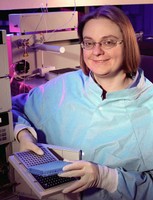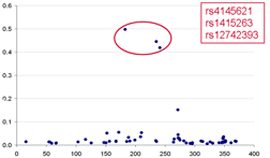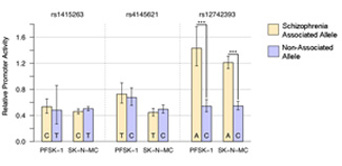Altered Gene Can Increase Risk of Schizophrenia


Brzustowicz, a professor of genetics at Rutgers and board-certified psychiatrist, said that the research has demonstrated a functional DNA change that increases gene expression. This conclusion is based on its presence in the genes of a Canadian study population of 24 families where multiple individuals had been diagnosed with schizophrenia. The gene in question, NOS1AP, previously known as CAPON, is one which Brzustowicz has been studying for six years.
The researchers used an innovative statistical technique that quantifies the evidence for association, in this case between the altered gene and schizophrenia. It enabled them to reduce the 60 variants of the gene (SNPs or single nucleotide polymorphisms) being evaluated down to a short list of three. This greatly simplified doing the subsequent cell cultures, a much more labor intensive task.

To measure the quantity of excess protein being expressed, each of the three candidate SNPs was introduced into separate cultures of cells derived from human brain tissue. To each culture the researchers also added DNA that contained the gene that makes a firefly glow, along with human regulatory DNA which would control the production of the firefly enzyme. The amount of expression of each SNP was reflected (via the regulatory DNA) in the intensity of the light the firefly enzyme produced. A luminometer measured the glow and showed a dramatic increase in gene expression in one variant over the others.
Bonnie Firestein, a professor in Rutgers’ Department of Cell Biology and Neuroscience, is conducting complementary research. She is investigating the consequences of increased expression of the NOS1AP gene. Firestein is looking at this gene in cells in culture and examining how the overexpression of this protein alters the way neurons branch.
Identifying this specific functional genetic variant is an important step, but there are qualifiers. Schizophrenia is not a single-gene disorder, and there are environmental factors that are also important.
Brzustowicz explained that having this altered gene does not necessarily mean that you will get the disease. Its frequency in the general population is more than 40 percent. Approximately 1 percent of the general population has schizophrenia but not all of those with the illness will have this altered gene.

Brzustowicz estimates that the frequency of the altered gene in people with schizophrenia is going to be higher than the average in the general population. For example, the frequency of this variant in people with schizophrenia in the Canadian families is 55 percent .
To refine this estimate, Brzustowicz and her team will be looking at the altered gene's frequency in DNA samples from the National Institute of Mental Health collection of cell lines housed in the Rutgers University Cell and DNA Repository. The collection includes samples drawn from large populations of Asian, Caucasian, African American and Hispanic individuals with schizophrenia.